Martial Law: Survival Guide
The covert operative’s civilian guide to living, surviving, thriving and operating in an urban environment while martial law is in effect.
When martial law is declared, your city transforms into controlled territory. The military isn’t “serving” the community but controlling it. Survival means staying invisible, adaptable, and prepared. This guide is based on tradecraft to get you through it.
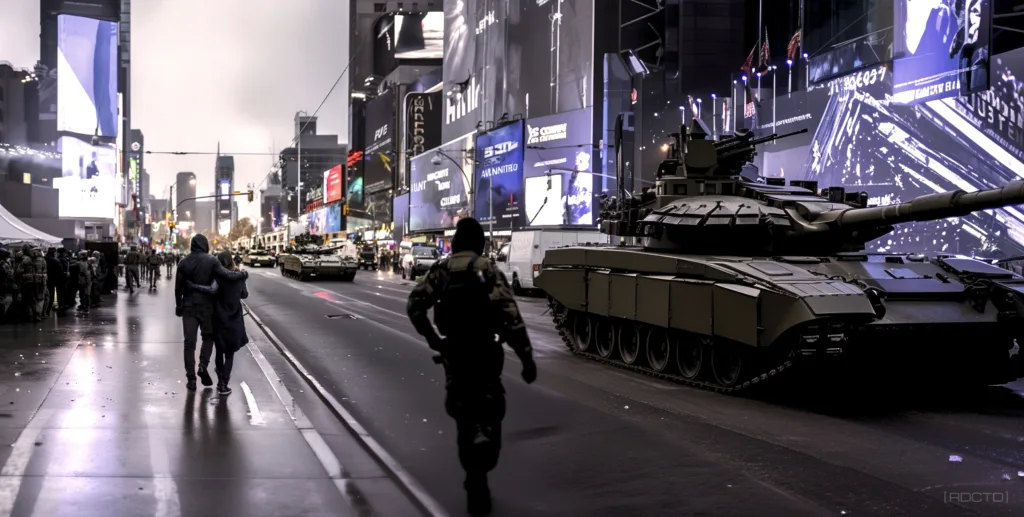
I. Understanding Martial Law
Martial law is a government’s declaration that the military is now running civilian life. Curfews, checkpoints, warrantless searches, confiscations, and suspension of rights become the new normal.
You’re not operating in a free society anymore. It’s now life under a system where the armed forces are the final authority.
When martial law hits, the first thing to realize is that it isn’t just “heightened security.” It’s a complete shift of power where military force overrides civil rights, and daily life is managed through intimidation and control. The rules you grew up under no longer apply.
What matters is compliance, survival, and knowing how to operate in a space where normal freedoms are suspended. Think of it as living in a city that’s become a military base, you’re a civilian on someone else’s turf.
Key Realities of Martial Law:
Movement is tightly restricted. Expect hard curfews, sometimes dusk-to-dawn, sometimes 24/7 lockdowns in certain districts. Travel papers, work permits, or official passes may be required even for short distances. Roadblocks, checkpoints, and patrols make every movement visible and risky.
Checkpoints and searches are constant. Soldiers will stop vehicles, search homes, and inspect belongings without warrants. Compliance is expected, and refusal is treated as defiance. Randomness is deliberate, it keeps civilians off balance.
Resources are rationed, seized, or redirected. Food supply chains are disrupted, shops run empty, and aid distribution happens under military control. Soldiers may confiscate goods “for the greater good.” Hoarding is punished harshly if discovered.
Information is filtered and weaponized. Media outlets may be shut down, the internet restricted, and phones monitored. Only approved news flows, often propaganda. Rumors will fill the gap, but spreading them can get you detained.
Public gatherings are outlawed. Any group beyond a few people can be labeled a protest or insurgent cell. Religious services, markets, even neighborhood meetings are disrupted or banned.
Dissent is crushed swiftly. A single loud voice against the system can trigger detention, or worse. Military response is less about justice and more about control. Civilians disappear quietly to discourage resistance.
Daily life becomes unpredictable. What’s legal today can be banned tomorrow. Patrol patterns, curfews, and ration schedules shift without warning. Adaptability becomes a survival skill.
Golden Rule:
Martial law is about control over you, not safety for you. Survive by adapting to the new rules, not fighting them head-on.
Martial law is less about keeping order and more about projecting control. The system thrives on fear, compliance, and uncertainty. To survive, civilians need to think less like citizens and more like operatives behind enemy lines: blending in, avoiding friction, and playing the long game until conditions shift back toward normal.
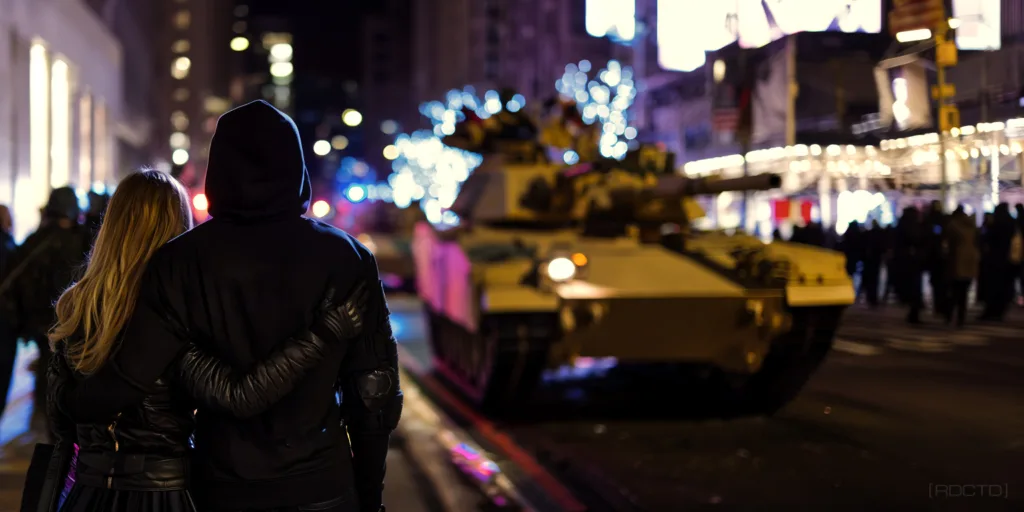
II. Operative’s Mindset for Civilians
The most dangerous mistake in martial law is thinking you can live the same way you did before. Freedom of movement, expression, and action are stripped away. If you don’t recalibrate your mindset, you’ll stand out like a flare in the night.
Survival now isn’t about being brave or loud. Now you have to be invisible, deliberate, and prepared to adapt to rapidly changing rules. You’re may still be living in your home city, but it will feel like you’r just surviving in controlled territory.
Core Civilian Tradecraft Mindset:
Stay gray and be forgettable. Standing out gets you noticed, and being noticed invites questions, searches, or suspicion. Don’t look like you’re struggling, but don’t look like you’re thriving either. Blend into the middle. Wear neutral clothing. Move like you belong. Be the kind of person soldiers don’t even remember an hour later.
Stay disciplined and control yourself first. Anger, fear, panic, these emotions leak into your body language and draw attention. Discipline means rehearsing your responses before they’re tested: calm voice, still hands, neutral face. If a soldier barks orders, compliance is immediate and non-confrontational. You submit, you survive.
Stay aware and observe everything. An operative survives by reading the environment before moving. Civilians must do the same: notice patrol schedules, note when checkpoints are busy vs. light, watch which stores still get shipments, track which neighbors attract attention. Situational awareness is currency under martial law.
Stay hidden in plain sight, normal is camouflage. Disappearing completely raises suspicion. Better to act normal (shopping lines, casual walks, routine behavior) while hiding your true intentions. You’re always projecting an image: a worker, a parent, a tired commuter. Choose the cover role that fits your environment and stick to it.
Stay flexible and never lock into one plan. Martial law is unpredictable. Curfews shift, checkpoints pop up, supply drops move. Always maintain at least two backup options for routes, supplies, and contacts. Rigidity gets people caught; flexibility keeps people alive.
Golden Rule of Blending:
Be forgettable. The civilian who looks average and acts predictable survives longer than the one who stands out.
Mindset is everything. If you can act, talk, and move like you’re just another powerless civilian while secretly managing your own survival, you’ll pass under the radar every time. The operative’s edge in a denied area isn’t firepower, it’s patience, planning, and invisibility. As a civilian, tradecraft is your shield.
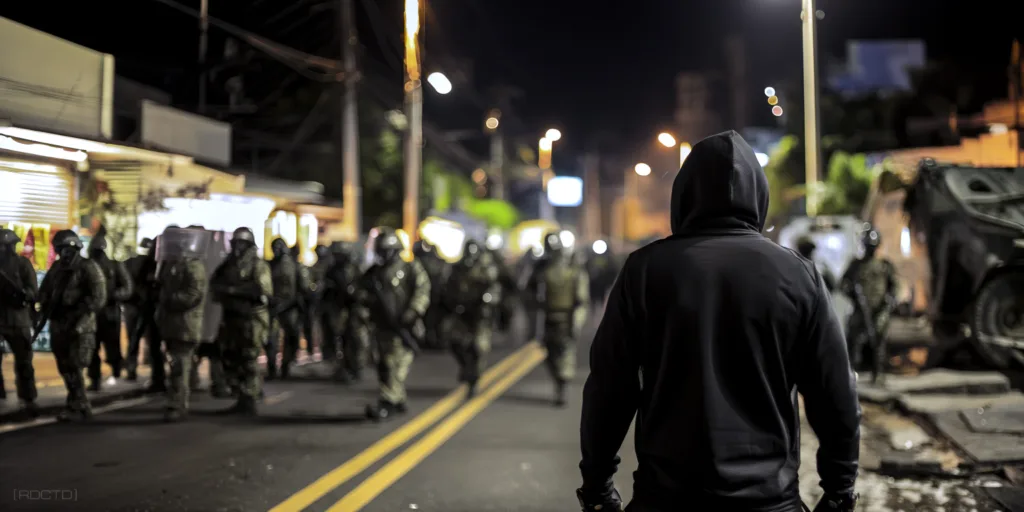
III. Security and Movement
When martial law drops, cities change overnight. Roads that were once open become controlled choke points, soldiers patrol neighborhoods, and even the act of walking too freely can trigger suspicion.
Movement is no longer about convenience, but becomes an absolute necessity. Even with basic travel of point A to point B, you’re navigating through a controlled grid where nearly every step is monitored.
Urban Movement Tradecraft for Civilians:
Travel light and unremarkable. Don’t carry large packs, tactical gear, or anything that screams preparedness. A worn-out backpack, grocery bags, or a messenger bag looks ordinary. If you must carry critical gear, bury it under layers of normal items – laundry, food, or work tools.
Move with purpose, not urgency. Nervous, hurried movement gets flagged. So does wandering without reason. Pick your timing and move as if you belong – whether you’re “heading to work,” “checking on family,” or “going to market.” Soldiers look for behavior that breaks patterns, don’t be that person.
Checkpoints are choke points. Every checkpoint is a trap: you’re funneled, observed, searched, and evaluated. Assume eyes are on you even before you reach it. Prepare ID, rehearse your cover story, and make your bag look boring. If forced to give something up, offer the decoy stash, not the real supply.
Pattern your routes, then break them. Know the streets, alleys, and back routes in your area. Map three ways to every important location: primary, alternate, and emergency. But don’t always use the same path, predictability is dangerous when patrols are rotating.
Avoid “hot zones.” Government buildings, police stations, military barracks, and protest areas draw the heaviest presence. Skirt these zones unless absolutely necessary. Violence, raids, and mass detentions often start there.
Blend into civilian flow. If there’s a food line, join it. If people are walking to distribution points, go with them. Being part of the herd shields you. Solo travelers draw more eyes than a mother carrying groceries or a worker moving with the crowd.
Curfew survival. Being caught outside curfew is a guaranteed problem. Soldiers don’t need a reason, they have orders. Always return home early, and if you must move at night, you need a strong, believable cover (medical emergency, family crisis).
Golden Rule of Movement:
Every step is a decision. Move with purpose, blend with the flow, and never give soldiers a reason to remember your face.
Movement under martial law is chess, not checkers. You plan three moves ahead, control your appearance, and make sure your reasons for being anywhere sound dull and believable. Soldiers remember troublemakers and oddballs; your job is to be forgettable.
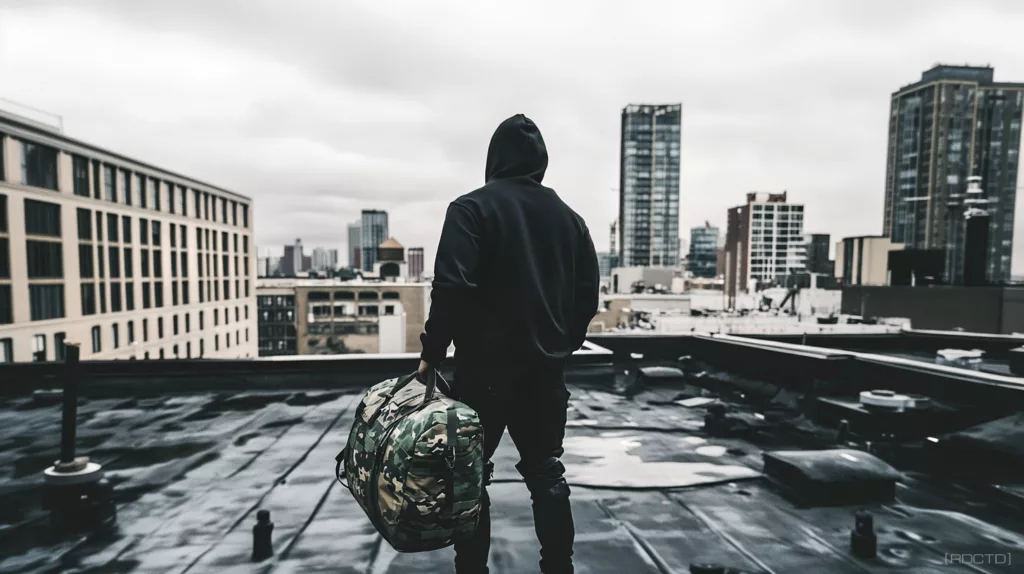
IV. Supplies and Resource Management
When soldiers control the streets, your food, water, and medicine become more than just survival, they become leverage points. Expect rationing, confiscation, and “searches” that are really seizures.
In this environment, the way you manage and hide supplies determines whether you last a week or a season. Your goal is to stay provisioned without ever looking like you’re provisioned.
Civilian Tradecraft for Supplies:
Layered Storage Strategy – Never Keep It All in One Place.
- Decoy Stash: This is what you’re “meant” to be found with. A few cans, some pasta, maybe bread. Enough that it looks like you’re surviving but not hoarding. Soldiers might take it, but it protects the real stash.
- Main Stash: Well hidden. False bottoms in drawers, behind wall panels, inside sealed paint or detergent buckets, under floorboards. Layer real items on top so even a quick inspection doesn’t reveal it.
- Mobile Stash (Go Bag): A compact kit pre-packed with food, water, meds, and essentials to last 72 hours. Kept ready for exfiltration.
- Food Priorities – High Value, Low Visibility. Shelf-stable goods that don’t draw eyes:
- Water is Life. Store in multiple small containers rather than one big tank. Easier to hide, easier to move. Keep purification tablets and know how to use makeshift filters (charcoal + cloth + gravel). Soldiers control official water trucks, don’t depend on them.
- Medical Supplies – Rare and Priceless. Painkillers, disinfectants, bandages, antibiotics (if you can get them). Store discreetly, even neighbors may betray you for medicine. Break into smaller caches so a search doesn’t wipe you clean.
- Energy and Light. Small solar chargers, power banks, candles, and batteries.
- Don’t flaunt working lights in a blackout, it draws attention. Blackout curtains become a survival tool.
Cash & Barter Goods – The Shadow Economy. When official money loses value or is restricted, barter thrives. Keep:
- Cigarettes (high trade value even if you don’t smoke).
- Alcohol (especially in small bottles).
- Soap, toothpaste, and hygiene items (scarce and valuable).
- Lighters and matches (simple but essential).
- Small tools (knives, sewing kits, multi-tools).
- Trade small, trade smart – never reveal your full inventory.
Deception & Inspections. Random home searches are a fact of martial law:
- Soldiers will open cupboards, flip mattresses, and look in obvious hiding spots. Your job is to “fail” the search in a believable way, give them something to take. If they find nothing, suspicion rises. If they find a little, they leave satisfied.
Golden Rule of Supplies:
It’s not just what you have, it’s what others believe you have.
Stockpiling is essential for survival under martial law, but so is concealing capacity. Operatives survive because they hide strength under weakness, civilians must survive the same way. You never reveal your full hand. You show the world a few scraps while keeping the real assets invisible, ready, and under your control.
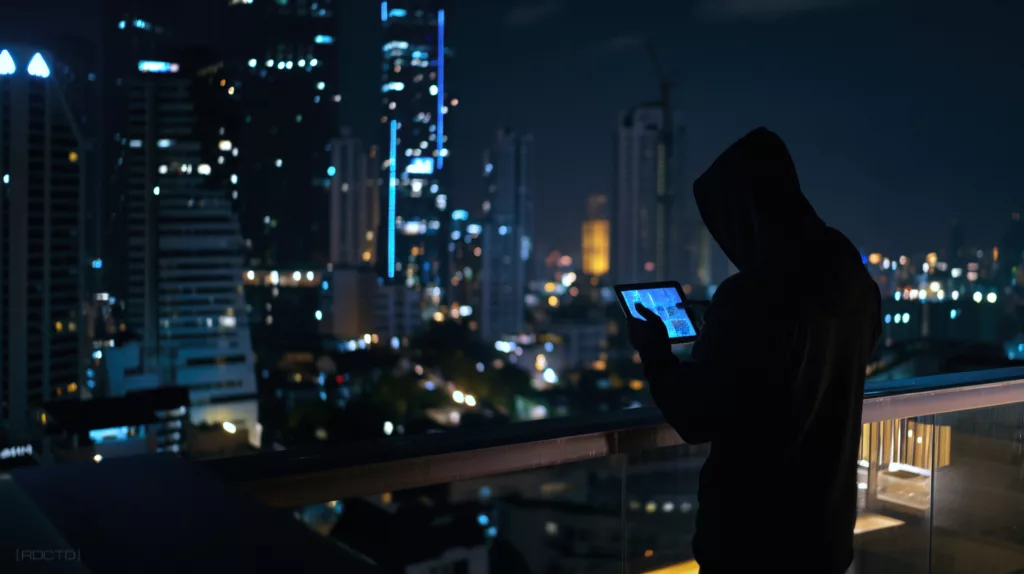
V. Information and Communication
Under martial law, information can become as valuable as food. Knowing when curfew shifts, where patrols concentrate, and how ration lines move can mean the difference between safety and disaster.
But information flow is tightly controlled, and careless communication can expose you. The key is collecting intel without being flagged, and passing messages without drawing suspicion.
Civilian Tradecraft for Information Control:
Radios Are Lifelines. Internet may be cut, and phones tapped. Radio endures. Keep:
- A hand-crank or battery-powered AM/FM/shortwave unit.
- Spare batteries sealed in plastic to prevent corrosion.
- Shortwave frequencies bookmarked. Sometimes foreign stations leak the truth when local media is censored.
- Operatives treat radio as their “ground truth”.
Phones Are Surveillance Devices. Assume every call and text is monitored.
- Don’t discuss supplies, routes, or plans over them. If you must use a phone, keep talk “white noise” normal – family chatter, small talk, never actionable details.
OPSEC Rules (Operational Security):
- Never reveal your real supply situation.
- Don’t brag, complain, or speculate openly, it marks you as worth investigating.
- Assume neighbors repeat everything they hear.
- Never write down anything sensitive without using cover language or codes.
Code & Cover Language. Operatives use coded phrases to mask intent. Civilians can adapt this. Example:
- “Visiting grandma” = moving along secondary route.
- “The kids are sick” = medicine needed.
- “We’ll have tea tonight” = safe meeting is still on.
- Keep it simple, consistent, and memorable for your circle.
Face-to-Face Is Still King. The most secure way to pass sensitive information is in person, in a controlled environment.
- Use noise cover (markets, crowded streets, near generators or machinery) to mask conversations. Don’t linger, don’t attract notice.
Reading the Street. Soldiers watch civilians for cues. Use observation as intel:
- If patrols suddenly shift, something’s brewing.
- If lines form, a ration truck is coming.
- If markets go quiet, a raid may be imminent.
- Quietly tracking these patterns makes you better prepared than 90% of the population.
Rumors Are Weapons. Authorities spread misinformation to control behavior.
- Neighbors spread rumors out of fear. Both can be dangerous if you act on them blindly. Treat every rumor as noise until confirmed by observation or reliable sources.
Golden Rule of Communication:
Every word is either camouflage or compromise.
Information under martial law is about two things: what you know, and what you let others think you know. Operatives survive by keeping knowledge close and appearances simple. Civilians should adopt the same discipline: collect quietly, share sparingly, and never let careless words reveal your real position.

VI. Neighborhoods and Social
Food and hiding are vital for surviving martial law but also it’s about people. Your neighbors, friends, and even relatives can either shield you or expose you.
Fear makes civilians unpredictable, and desperation makes them dangerous. Social survival means balancing cooperation with secrecy – build useful connections without ever revealing your full hand.
Civilian Tradecraft for Social Dynamics:
Build quiet alliances. A single person can’t cover every threat. Neighborhood ties matter – someone to trade with, someone to watch your back, someone to swap intel. But choose carefully. Test trust by sharing something small and observing how they handle it before giving more.
Reputation is armor. Don’t look rich, don’t look starving. Be seen as average, reliable, and helpful without standing out. If neighbors see you as the guy who helps patch a roof or shares a cup of rice, they’re less likely to suspect you’re hiding bigger reserves.
Never reveal full capability. Operatives never show their real strength in hostile zones. Civilians must do the same. If you have a water filter, don’t brag – let people think you “just got lucky” finding clean water. If you can cook better meals, make it seem like a one-off, not a routine.
Hoarders and loners become targets. The guy who shuts his door and never talks becomes a suspect. The guy who clearly has more than everyone else gets denounced. Blend into community routines just enough to avoid suspicion – lines, distributions, and casual chatter.
Information is currency, spend wisely. Share small, harmless intel to build trust (“I heard curfew may start an hour earlier tonight”). Hold back the important details. This builds your value as a source without risking your position.
Conflict avoidance. Arguments, rivalries, or disputes over rations can spiral into accusations. Keep your tone calm, never escalate, and walk away early. The state doesn’t care about your innocence, it cares about compliance. One angry neighbor can put you in a cell.
Community watch without formality. Neighborhood “watches” often get co-opted by authorities. Instead, build informal observation networks – people who notice patrols, food trucks, or searches. Keep it loose, keep it casual. Structure invites infiltration.
Visualize trust like layers:
- Inner Circle: Family or one or two proven allies.
- Middle Circle: Neighbors you trade with, share minor info.
- Outer Circle: Casual contacts, useful but untrusted. Never let the outer circle see past your mask.
Golden Rule of Social Survival:
Appear open enough to be trusted, but guarded enough to stay secure.
Martial law breeds suspicion, envy, and betrayal. Your goal is to manage perception – helpful but not wealthy, connected but not leading, ordinary but not desperate. An operative survives hostile cities by reading the human terrain like a map, civilians need to learn the same tradecraft if they want to last.
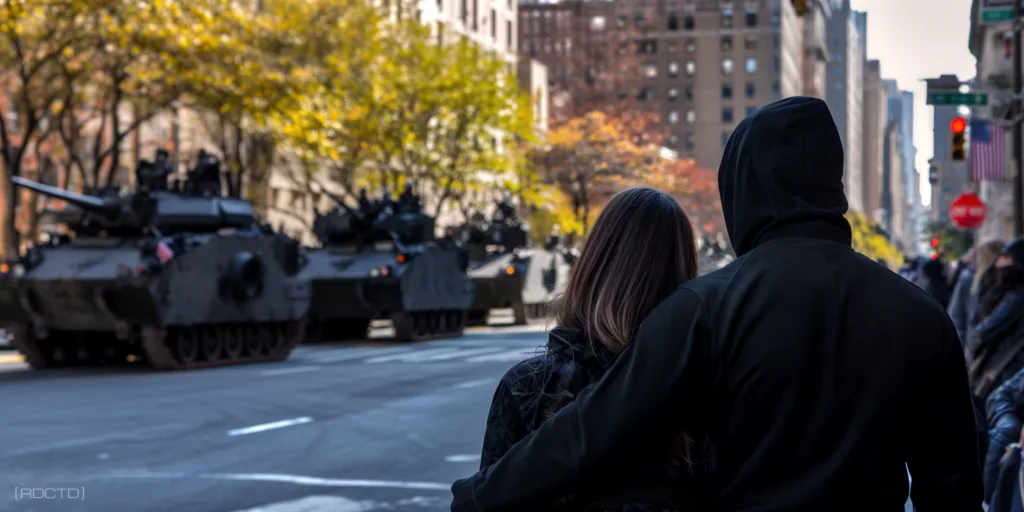
VII. Mental and Emotional Control
When soldiers are on the streets and neighbors are disappearing, the greatest threat isn’t always hunger or checkpoints – it’s fear. Martial law is designed to break morale: curfews isolate you, raids shock you, propaganda overwhelms you, and unpredictability keeps you off balance.
If you can’t control your own mind, you’ll make sloppy moves, expose yourself, or quit before the fight even starts. Survival under martial law begins with discipline of thought and emotion.
Civilian Tradecraft for Mental Resilience:
Routine is stability. Under chaos, routine creates order. Operatives use strict daily schedules to stay sharp. Civilians should too:
- Morning: check perimeter, stretch/exercise, water check.
- Midday: observe patrols, gather intel, ration food.
- Evening: inventory supplies, prep go-bag, quiet reflection.Repetition anchors your mind and keeps panic from taking root.
Detach from authority encounters. When soldiers scream, search, or harass, don’t take it personally. Treat it as theater, play your role as the compliant civilian. Neutral face, calm voice, no arguments. Emotional outbursts mark you as a target.
Control fear before it controls you. Fear is natural, but letting it show makes you vulnerable. Practice breathing control, still body language, and rehearsed phrases (“Yes, sir,” “Understood”). Soldiers scan for weakness. Don’t give it to them.
Hope is survival fuel. Martial law is temporary by design, no government can sustain it forever. Keep that perspective. Write small goals: “Survive this week,” “Keep water stocked,” “Map two new routes.” Short victories build momentum.
Avoid politics, focus on survival. Debating, ranting, or resisting openly is suicide. Leave ideology aside and focus on survival. Operatives don’t fight unwinnable battles, they outlast them. Civilians should adapt the same patience.
Protect morale like supplies. Laughter, stories, small rituals – they’re survival tools that seem like luxuries. Share small meals, celebrate minor victories, keep spirits afloat. A mentally strong group outlasts a broken one.
Anchor with identity. Martial law strips rights, but it can’t strip who you are. Whether it’s faith, family duty, or personal code, keep an anchor that grounds you. That inner compass prevents despair when the world feels lawless.
Golden Rule of Mental Survival:
Control yourself, or someone else will control you.
An operative never lets the environment dictate his state of mind, he dictates it himself. Civilians under martial law need the same discipline. If you can hold your mind steady while everyone else cracks, you’ve already gained the biggest survival advantage: clarity when others panic.
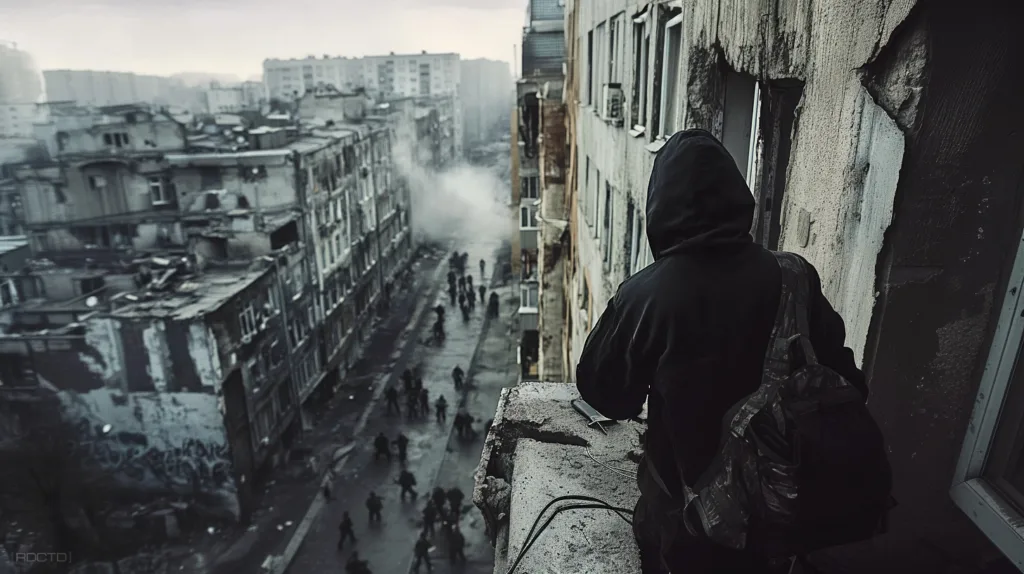
VIII. Contingencies and Exfiltration
Sometimes survival means holding ground. Other times, it means getting out before the walls close completely. Martial law turns cities into cages, and once resources collapse or patrols intensify, staying becomes a gamble.
Exfiltration – slipping out quietly and blending with displaced civilians, is a last-resort play, but every smart civilian prepares for it in advance. An operative never enters a denied area without an exit plan. You shouldn’t live under martial law without one either.
Civilian Tradecraft for Escape Planning:
- Route Mapping – Three Paths Minimum.
- Primary Route: The most direct way out, usually along main roads. Will have checkpoints – high risk, but fastest.
- Alternate Route: Less obvious paths – rail lines, industrial zones, riverside tracks. Fewer soldiers, but rougher travel.
- Emergency Route: Non-traditional exits – sewers, utility corridors, drainage tunnels. Dangerous but least monitored.Scout these ahead of time, mark choke points, and update often. Patrols shift without notice.
Timing is Survival. Best time to move is dawn or dusk – enough light to see, but not enough to stand out.
- Midnight movement screams “suspicious.” Moving during mass civilian displacement (ration runs, relocations, evacuations) provides cover in the herd.
Travel Camouflage. Don’t look like a prepper on the run. Look like a tired, displaced civilian:
- Use a neutral backpack, not tactical gear.
- Carry ordinary items (blanket bundle, grocery bags).
- Clothing should be plain (dark gray, brown, navy) – no camo, no fancy logos.
- If traveling as a group, look like family, not a squad.
Staging Points & Safe Houses. Identify fallback spots inside the city (friend’s basements, abandoned shops, hidden corners) where you can lay low before pushing out.
- Exfiltration is rarely one clean move; it’s usually stages of movement and rest.
Cover Stories for Movement. Soldiers want explanations. Be ready:
- “Heading to visit sick relatives.”
- “Relocating to family in the next district.”
- “Work transfer ordered.”Keep it dull, consistent, and rehearsed.
Go-Bag Discipline. Your mobile kit is your lifeline. It should include:
- 2–3 days food and water.
- First aid kit + basic meds.
- Knife / multi-tool.
- Flashlight + spare batteries.
- Cash + barter goods.
- Map + compass.
- Tarp or poncho.
- Keep it light enough to run with. Heavy bags get abandoned fast.
Travel in Shadows, Not Darkness. Total stealth movement (creeping in dark alleys) can look more suspicious than blending in.
- Better to move like a normal refugee than a ghost in the night.
Final Decision: When to Leave. Signs it’s time to exfiltrate:
- Food or water supply is collapsing.
- Patrols increase to constant presence.
- Civilian neighborhoods are being evacuated or raided.
- Reliable escape routes are closing fast.Waiting too long locks you in. Leaving too early wastes supplies. The call is yours, but make it before it’s forced on you.
Golden Rule of Exfiltration:
Escape is momentum reversed – speed without noise, presence without attention.
An operative leaving a hostile city doesn’t sprint for the border unless that’s the best move, which it rarely is. He moves like he belongs at the speed of the local rhythm, until he’s outside the wire. Civilians must do the same. If you can slip out looking like just another weary face in the crowd, you’ll live to rebuild when the lockdown finally breaks.
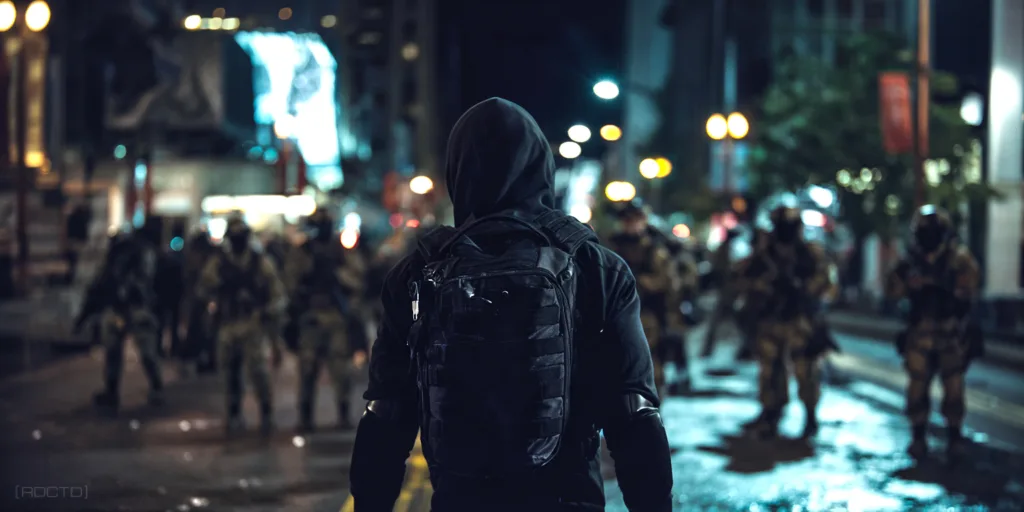
Martial Law Facts and History
Martial law literally means “military law.” The term stems from “martial,” which relates to Mars, the Roman god of war—marking the military’s takeover of civil governance.
Only two U.S. presidents ever declared martial law. Abraham Lincoln did so during the Civil War (including suspending habeas corpus), and Governor Joseph Poindexter imposed it in Hawaii on December 7, 1941.
Rhode Island’s 1842 martial law was the first upheld by the U.S. Supreme Court. This occurred during the Dorr War and lasted nearly a year until a new state constitution was adopted.
Federal troops took over law enforcement in Alabama’s Phenix City in 1954. Martial law was declared to root out corruption in local police and gambling rings. The Guard confiscated weapons, shut down establishments, and supervised elections before lifting martial law in January 1955.
In West Virginia’s 1920–21 Coal Wars, martial law jailed union miners without trial. The repression of striking miners included arbitrary arrest and imprisonment to crush union activity.
South Korea frequently used martial law from 1948 until the 1980s to suppress dissent. It was first declared in 1948 amid communist unrest and used again in 1979–80, culminating in the deadly Gwangju crackdown.
Taiwan’s “White Terror” under martial law lasted nearly four decades (1949–1987). The period saw mass repression: thousands executed and tens of thousands imprisoned for perceived dissent.
Ex parte Milligan (1866) prohibited military tribunals for civilians when civilian courts function. This landmark Supreme Court ruling limited martial law overreach during and after the Civil War.
President Lincoln’s 1862 martial law declaration and military tribunals lasted into Andrew Johnson’s presidency. They exemplified extended military power in domestic governance during and immediately after the Civil War.
Military doctrine linked to martial law influenced modern wartime law. Lincoln’s General Order No. 100. Known as the Lieber Code – became the basis for later laws of land warfare and international conventions like The Hague.
The Last Word
A good operative in hostile territory doesn’t waste energy fighting the system head-on. He adapts, blends, and waits for the moment when conditions shift. As a civilian, you need the same tradecraft: stay gray, stay prepared, and never put all your trust in one plan.
The people who make it through aren’t the toughest, they’re the ones who knew how to stay adaptive until normal life returned.
[INTERNAL INTEL : CIA ‘Urban Survival’ Concept]
[EXTERNAL INTEL : Martial Law Street Guide]








